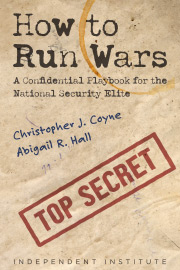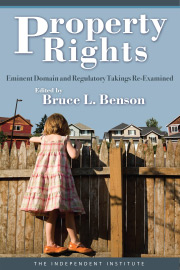The fog of war makes it difficult for most people to think beyond the here and now. In the wake of the chaotic U.S. exit from Afghanistan in August 2021, policymakers, the military and others focused on the bungling of the singular operation—the withdrawal—and not the overall feasibility or desirability of U.S. foreign policy.
Any window for broader introspection closed with the Russian government’s invasion of Ukraine in February 2022, which led to renewed calls for American involvement abroad. The following year, in October 2023, Hamas attacked Israel. Most recently, the governments of Israel and Iran have engaged in tit-for-tat military strikes.
These conflicts have spawned constant arguments about aid and other involvement. Concerns over China, North Korea and other unfriendly regimes generate further debate about how U.S. policymakers should respond to specific scenarios.
Although these conversations are relevant, they highlight an important blind spot in foreign policy. It is exceptionally difficult for many to rise above the fog of war and look at the big picture. But they must do so, or else we will remain mired in a myopic and continuous cycle of war-making, moving from one crisis to the next.
Our never-ending proactive foreign policy has normalized war-making, with its significant costs and brutal realities. When war and foreign intervention are treated as immutable facts of life, our focus shifts from understanding their realities and causes to their violent execution. We treat the symptom while ignoring the disease that caused it.
Writing in the late 19th century, Argentine political theorist John Baptist Alberdi noted that war legitimizes crimes such as robbery, murder, arson and destruction on a massive scale. These activities, outlawed and viewed as wrong throughout the world, become business as usual.
“War sanctions [these crimes],” he wrote, “and converts them into just and lawful acts...a horrible and sacrilegious perversion of sense, which is a sarcasm on civilization.”
What Alberdi asked us to realize is that our myopic focus on today’s conflict requires us to think in simple dichotomies—“good” and “bad,” or “us” versus “them”—while neglecting the true horrors of the enterprise of war itself. The treatment of war as something unavoidable presumes from the start that the atrocities of war cannot be avoided.
When faced with the brutal actions of others, proponents of war say, “What are we to do other than use force in response to force?” One simple but neglected answer is to not respond with violence, precisely because we recognize the inherent savagery of the war-making enterprise.
The typical reaction to this answer is that it is naive. But that reaction is itself naive. How confident can we be that, in all cases of war-making, all other feasible, nonviolent means of navigating conflicts have been exhausted, leaving war as the only remaining option? Are we confident that there are clear and attainable objectives with a high likelihood of success; that the wide range of unintended consequences have been fully considered?
Beyond these issues, the normalization of war-making neglects other significant consequences. These include fiscal and imperial overreach, expansions in the scale and scope of government power at home and the concomitant erosion of constitutional constraints.
It also neglects the natural result of continuous interventions in complex systems—the emergence of a network of intricate tripwires, or hidden triggers, that ignite conflict and violence. These tripwires are easily set off, pulling the U.S. and hence the U.S. citizens it represents into a perpetual war for perpetual peace.
Because of the presidential election later this year, many foreign policy discussions are framed as a contrast between the two nominees, Joe Biden and Donald Trump. But perhaps the bigger issue is that the decades-long U.S. role as the world’s policeman has significantly stressed the nation’s economic and political institutions while normalizing war-making and the crimes inherent to war.
Only by rising above the fog of war can we hope to appreciate these nuances and think about alternative paths to peace that avoid the brutalities of armed conflict.
















